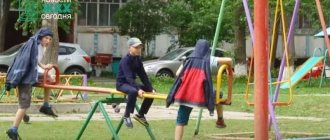How to find out if a deceased person has heirs
It often happens that after the sudden death of a citizen it turns out that he does not have a will, or his whereabouts have never been established.
In such a situation, you should start searching for a document or next of kin. If the paper is never found, then children, husbands (wives), mothers and fathers will receive the inheritance.
All property of the deceased will be transferred according to the order established by current legislation. But according to a will, for example, property is not distributed among all relatives, but can be left to only one person.
To find this important document, you first need to know that it is drawn up in two copies. One of the copies must be kept by the testator, and the second by the notary. Each copy must be notarized, otherwise they will not have legal force.
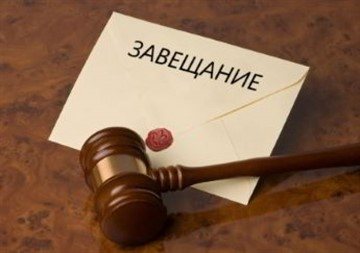
As a rule, you should look for such a document at the home of the deceased testator. Often the paper is stored in a safe or cabinet with valuable documents.
If, as a result of a lengthy search, the will has not been found, then you need to immediately go to a notary. The question immediately arises: where to find this authorized official?
The first thing you should do is contact the notary office, an employee who works at the place of residence of the deceased. If he does not have the will of the deceased, it is recommended to contact another notary. Sometimes it happens that in large cities the responsibilities are distributed among several notaries, so you will have to visit each of them.
When visiting an authorized person, you should have the following documents with you:

- passport;
- death certificate of the testator;
- documents confirming relationship with the deceased.
It often happens that it is impossible to find this important document. This usually happens if the deceased did not have time to make a will. It is recommended to make a formal request to the notary chamber of the district or region.
The responsibilities of this structure include registration and recording of all transactions made by local notaries
To obtain all the necessary information, it is important to go to them in person
If you wish, you can simply send a request. To do this, you must send all the required documents confirming the relationship. They will prove their identity
It is also important to provide a death certificate of a close relative who is the testator.
After processing the sent request, the person who submitted it will definitely receive a response, which will indicate that:
- if a will exists, and the person is not registered in it as an heir, then this will be indicated in the response received;
- among other things, you should remember that all the names of the heirs are strictly confidential information that is not subject to disclosure. For this reason, it is impossible to know exactly who is the heir to a particular property.
The interest of the heirs in the search for all applicants
In order to declare their right to inheritance, applicants must contact a notary. They must do this within six months from the date of the recorded death of the testator. If there is a will, all applicants for the inheritance are known to the notary, because they were indicated by the testator himself. Therefore, they are not difficult to find. It's another matter when inheritance occurs in accordance with the law.
Expert commentary
Kolesnikova Anna
Lawyer
In order to fairly divide the inheritance, all legitimate claimants to it must be found. The opinion of the heirs that they will get more if not all applicants show up is false. Their initial benefit, when the testator's property is distributed without allocating a share to the absent relative, can turn into problems in the future.
When an applicant for an inheritance who has not declared his right in time learns about it, he can take over the rights of inheritance through the court. After the restoration of his rights, the heirs who received the testator's property will have to participate in the redistribution of the received property.
If by this time they have managed to dispose of the inheritance at their own discretion, for example, to sell or exchange an apartment, then the new applicant must receive from them compensation adequate to his share. This development of events will not please anyone. Therefore, the heirs should be interested in the timely announcement of all applicants for the inheritance and help in their search.
Three stages of interaction with a notary
The sequence of visiting a notary’s office is determined by the procedure for accepting an inheritance and mainly consists of three stages:
1. At the first visit, an application is submitted, and he opens an inheritance case. For this purpose, he requests documents - general and sometimes additional. The heir must collect and provide all the necessary documents on his own, because this is not the responsibility of the notary when registering an inheritance after the death of the father, mother and other testators. But if he wishes and has the funds, the heir can entrust this matter to a lawyer, thereby avoiding red tape and visiting many government agencies with their queues. Also, registering an inheritance with a notary after the death of the mother, father or any other testator provides that he is obliged to give advice on:
- further collection of documents, taking into account the type of property and the nuances associated with it.
- circle of heirs who also claim the right to register an inheritance for themselves.
- payment of state duty.
2. At the second consultation, the heir provides a package of documents collected by him since the first meeting, and gives checks confirming payment of the state fee. After this, the date for issuing the certificate of inheritance is set.
3. The third meeting is the actual issuance of a certificate confirming the right to inheritance. It is necessary to check the data specified in the document and register with the UFS, which gives the heir the right to dispose of the new property without restrictions.
But when is a notary obliged to suspend the issuance of certificates to heirs? The period for issuing the certificate is 6 months from the date of application. But, as Article 1163, paragraph 3 of the Civil Code of the Russian Federation provides, in some cases extradition may be suspended:
Who is interested in searching for heirs by will and by law?
Searching for heirs by a notary is not the only measure if other claimants to the property have not shown up. First of all, applicants for property who assume the rights of an heir by law are interested in finding them. Only at first glance it seems that the other heirs receive many benefits from the applicant who did not show up. The division of the inherited property, in this case, will be distributed without taking into account his interests. But you should always remember that a person, when he learns about the existence of an inheritance, has the right to enter into the inheritance through the court.
Most likely, the court will approve the restoration of the terms of the inheritance to the applicant if he proves that he did not know about the death of the testator. In this case, property is redistributed taking into account one more person.
The heirs may already have time to carry out certain actions with the property. For example, sell it. However, this does not relieve them of responsibility. If the applicant's share is sold, he must receive proportionate financial compensation. Such a turn causes a lot of inconvenience to the heirs. Therefore, you should not take risks and hope that the applicant will not show up at all. It is better to search for heirs by last name or other data yourself.
Who should search for legal heirs?
Often, the search for heirs is carried out by a notary who is involved in this matter. It is his responsibility to notify all heirs. The legislation establishes 7 queues that have the right to inheritance. If the notary knows the addresses, he must notify them in writing, and if none are established, he must contact the relevant authorities. He can also leave an advertisement in the newspaper looking for a specific person.
But at this stage a situation may arise that the notary refuses to search for heirs because:
- The first reason is that the notary is not paid for such a procedure, and the search sometimes takes a lot of time;
- The second basis for refusal may be the law. This is due to the fact that state legislation does not provide for the assignment of duties to the notary to search for heirs.
Therefore, special attention should be paid to the right of inheritance when purchasing living space. When purchasing an apartment in which people lived, in order to avoid very unpleasant situations, it is worth asking the owner about the right of inheritance. So that in the future such problems do not arise that legal heirs appear who did not know about their right.
Because this can lead to lengthy court hearings, raising a lot of documents and this takes a lot of time. To eliminate the possibility of such problems, you can conduct an independent search for information about the apartment and the intended heirs. It is also worth finding out why the owner wants to sell this living space.
Sometimes it happens that the owner who is selling the living space himself does not know about the possible heirs. Therefore, this point must be clarified. To find out the necessary information, you can talk to your neighbors, the local police officer, who may know important information. Because official authorities may not always know whether the heir has first cousins or second cousins.
In addition, you need to check the presence of a house register and an extract from it. Who lived in this apartment, since usually those who have registration in this apartment have full inheritance rights, although they do not live at the place of registration. Then you need to find them and find out whether they know about their right of inheritance or claims regarding the sale of this living space.
The procedure for entering into inheritance.
Is it possible for a first-priority heir to challenge a will? Read here.
Who can claim a mandatory share in the inheritance?, read the link:
The next step before signing the purchase and sale agreement is to take an Extract from the Unified Register where the rights to the property are indicated, thereby you can find out the current owner of this apartment. Such a document can be a powerful argument in court in case a legal heir appears a few years later.
If you find an heir who did not know about his rights, then it is necessary to receive from him a document certified by a notary. The essence of this document is that:
- the applicant for the inheritance knows about the death of the testator;
- about the date when the right to inherit it was opened;
- and also that he has no objections to the inheritance of property by other heirs and its sale.
In addition, if during the search process no heirs are found, it is best to play it safe and draw up a document certified by a notary with the seller of the living space. It is necessary to stipulate in it the issue that if any problems related to inheritance arise, he undertakes to solve them independently and at his own expense.
The presence of such a document will allow future owners to be sure that they will not have problems with possible heirs. This will also significantly reduce the risk of buying an apartment from scammers. Because illegal sales of living space occur quite often.
What is the procedure for searching for heirs?
The notary chooses the method of informing known heirs independently. As a rule, letters are sent by mail with a request to visit the office to write an application for acceptance of the inheritance or refusal of it.
USEFUL INFORMATION: Challenging paternity, judicial practice
According to Article 61 of the Fundamentals, publication in the media or public notice is also allowed, although in practice this method of information is used extremely rarely.
In many ways, the method that the notary chooses to inform will depend on the completeness of the information that he has about a particular heir.
What will happen, or will none of the heirs contact the notary?
Perhaps a person had only one heir, and he adopted him after the fact. In this case, such an heir may not contact the notary at all. However, this is fraught with some difficulties in the future. Without a title document for inheritance, it will be impossible to re-register real estate or transport in your name. If you miss the six-month deadline, then you will have to go to court to confirm the fact of the actual acceptance of the inheritance by a court decision.
There are cases when a person has no heirs in principle, or all of them were declared unworthy or refused the inheritance.
In this case, the inherited property is recognized as escheated and becomes the property of the municipality (real estate) and the Russian Federation (other property).
When property has passed into state or municipal ownership, it is possible that some heirs may appear who previously did not know that the testator had died. It will be possible to reclaim the property only in court.
This process is not easy, and it is unlikely to be possible without qualified legal support.
Checking the fact of inheritance
After the death of a relative, you need to submit a package of documents and an application to the notary to formalize the right of inheritance. But the submission of papers to the notary's office is carried out only for a period of 6 months from the date of death of the testator. If a delay is detected, the notary is authorized to issue a refusal to formalize the succession, and the heir will have to go to court.

It is easier to find relatives of the deceased if there is a will. Witnesses present during the writing are prohibited from disclosing information about the existence and contents of the document. The opening of the last will is carried out only after the death of the citizen.
It is possible for potential successors to check whether a will has been drawn up in person. To do this, it is possible to search for documentation inside the deceased’s home, ask the territorial notary, or send a written request to the notary chamber.
Notary firms themselves do not transmit any information about the death of citizens; they can only learn about what happened from applicants for inheritance.
Upon receipt of documentation for the death, the notary will be able to notify those successors whose residential address is known to him, but in the absence of a stated will of the testator, he is not obliged.
When inheritance is carried out legally due to kinship, the lower the degree of kinship ties, the further the position of the successor in the order and the less likely it is that the notary will become aware of him.
Even if the heir belongs to the first priority, but there is no information about registration or permanent place of residence, then there is a possibility that he will not receive a notification.
Recommended reading: Unworthy heirs
If there is no will
In the absence of orders from the testator regarding the fate of his property in the event of death, that is, in the absence of a notarized will, we are guided by the rules established by law.
And these rules are such that all possible heirs (that is, relatives and not only) are divided into queues in accordance with the degree of relationship. Therefore, the people closest to the deceased go first, and the most distant relatives, as well as disabled dependents who inherit simply by virtue of the direct instructions of the law, go last.
When a specific notary does not have a special order in the form of a will, he therefore does not have information about potential heirs. Therefore, hoping that he will suddenly become aware of your place of residence or work is, at a minimum, naive.
The heir must reveal himself
Most likely, if after the opening of the inheritance no one shows up within the time specified by law, the notary will simply publish information about the opening of the inheritance in the media. That's all. And after the expiration of the period established by law, the property will be recognized as escheated and transferred to local governments.
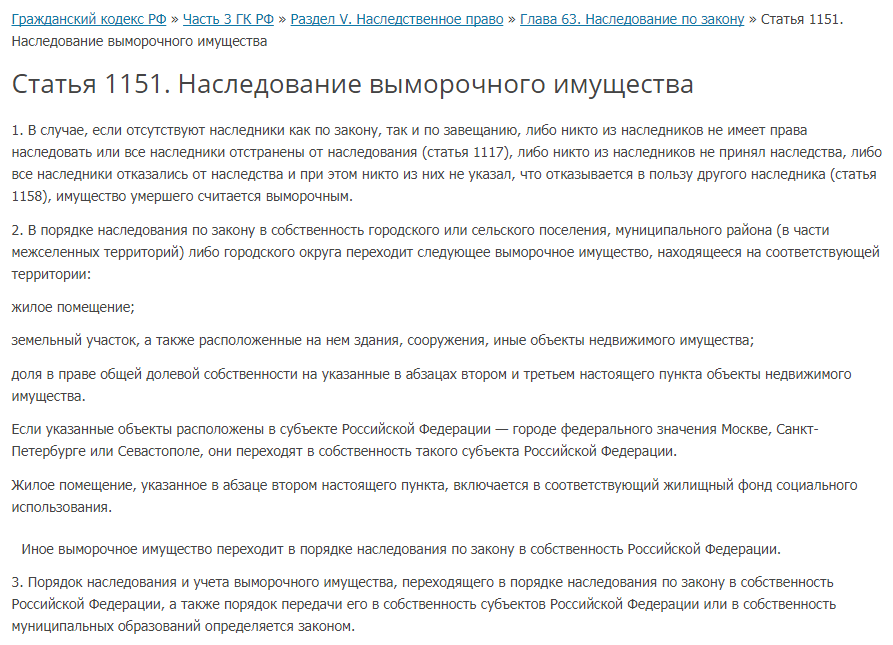
Article 1151 of the Civil Code of the Russian Federation. Inheritance of escheated property
In some sources you may come across the opinion that in this case the notary will contact the internal affairs bodies to search for the relatives of the deceased. But we can say with confidence that this is nonsense. No one compensates him for the time spent on this (often meaningless) activity, so no notary will be puzzled by what the law, in principle, does not oblige him to do.
What can be advised in such cases: do not lose contact with relatives. Fortunately, in the modern world of social networks and the Internet, this task is more feasible than ever before.
Inheritance is carried out according to the laws of the country of the testator
How do heirs know about the presence of a will?
According to the law, all witnesses to the testator’s drawing up of a will, including a notary, do not have the right to disclose information about its availability and the contents of the text drawn up by the testator until the opening of the inheritance case. Often the heirs themselves do not know anything about it, unless the testator himself informed them about the existence of the testamentary document and where it is kept.
When opening an inheritance case, the notary must notify the persons specified in the will that they are included in the will. But if he does not have information that the testator has died, then the deadline may be missed. Therefore, the heirs themselves should be interested in the timely search for a will after the death of the testator. In order not to miss the deadline for entering into an inheritance, they can contact both the notary himself and obtain information from the register of wills, which was created by the Russian Federation. Such a register allows you to create more open conditions for the work of notaries and avoid various frauds with inheritance.
The register includes general information about wills drawn up by both public and private notaries. The information is presented in electronic form and is classified information, protected from viewing by unauthorized persons.
Expert commentary
Leonov Victor
Lawyer
Thanks to the creation of such a register, it is much easier for the heirs to find the document drawn up by the testator. In addition, if the original will is lost, the notary can always confirm its presence using an electronic document. Access to information is limited. The authors of the site sign a non-disclosure agreement regarding the information contained therein.
Representatives of the notary can provide information to the heirs only after the death of the testator, subject to the presentation of the following documents:
- death certificate of the owner of the inheritance;
- identification document of the applying citizen;
- certificates and documents confirming the relationship with the testator.
The applicant for the inheritance must attach these documents to the application for information about the will.
Sample statement about the absence of other heirs
Everything mentioned above can be done by the heir himself. Moreover, it is enough to submit a notarial application, on the basis of which the notary will carry out all the necessary measures, establish the number of possible heirs and determine the incumbent. He will decide to shorten the term of the notarial inheritance case, and the heir, having assumed the rights of the owner, will be able to sell the apartment in 3 months.
Required details
To obtain a passport for the property of the deceased, you must officially contact a notary. The application form is free, but the general requirements for legally binding documents must be met. A document becomes invalid if it does not contain:
- dates, places, names;
- details of the notary authority;
- information about the heir and testator;
- data on the legitimacy of claims;
- notarization and registration;
- signature of the heir with a transcript.
The absence of at least one of them leads to the recognition of a legal document as invalid. Even errors and inaccuracies made in the text will lead to unpredictable consequences.
Information about the testator and successor
It is important to provide comprehensive information in the text to identify the parties to the inheritance transaction. To do this, indicate the Last Name, First Name, and Patronymic in full; you will also need the registration address of each
It is advisable to register SNILS. This is necessary so that there are no misunderstandings in the case of full namesakes and namesakes. Information is also needed to determine the circle of persons to be called as compulsory heirs in the notarial order.
Guarantees about the absence of other heirs
The heir who puts the property up for sale is obliged to guarantee that he is the only actual owner. To do this you will need:
- extract from the state register;
- death certificate of the previous owner with notarization;
- notarized confirmation of the absence of other heirs;
- a receipt accepting responsibility for the violation.
The essence of the last document is that if other heirs appear, the seller undertakes to independently and at his own expense resolve material disputes by paying the new applicant the required monetary equivalent of the due share.
Obligations of the heir with references to relevant legislative acts
- enter into inheritance;
- make sure there are no other heirs;
- re-register the property in your name;
- sign the agreement and the transfer deed.
Notarization and signature of the heir
These are two mandatory attributes, the absence of which deprives the document of legal force. The essence of the certification is to confirm that the autograph was signed by the citizen who is participating in the transaction. His capacity and legality are also confirmed. Next to the signature there is a transcript (full name), and the relevant section should contain the details of the signatory.
Independent search for heirs
Sometimes the greed of some heirs can prevail over common sense.
They will decide that there is no need to report other heirs to the notary, and they themselves do not need to report the death of the testator - they will get a larger share.
USEFUL INFORMATION: Owner of non-privatized apartments
Sometimes it even gets to the point where the heirs deliberately distort information, mislead other heirs and the notary himself, and all in order to prevent other persons from accessing the inheritance, to which their hands are already reaching out so much.
However, such behavior may result in this cunning person ending up without an inheritance altogether. According to Article 1117 of the Civil Code of the Russian Federation, such heirs may be considered unworthy and excluded from the inheritance.
But the opposite situation also happens, when some heirs look for others so that they can equally accept their share of the inheritance. This behavior of people is dictated not only by high moral qualities, but also by a purely legal meaning.
The situations can be very different.
When you are one of the contenders for an inheritance
For example, the testator had two sons - one lived with his father, and the second lived somewhere abroad. The brothers had a very cool relationship, and they didn’t even communicate with each other; the son who left had also quarreled with his father a long time ago.
So, the father dies and leaves a house as an inheritance. The son who lived with him draws up all the documents, enters into the inheritance, and does not tell his brother anything. The house becomes the property of one son, and the second learns that his father died only a year later.
Naturally, the second son is shocked. But not because he lost his father, but because his inheritance was omitted. He goes to court, reports that he did not know and could not know about the opening of the inheritance, the court restores the period for his entry into the inheritance and cancels the certificate previously issued by the notary, prescribing to the court decision that the house is to be inherited as shared ownership by ½ each.
If the first son had already managed to dispose of the property by selling it, he would have to return half of the money received.
In order to avoid such situations, it is better to immediately ensure that all potential heirs are notified of the death of the testator.
Of course, if in this case there was a will, and the father wrote everything to the first son, then the second would not have to count on anything (except if he was disabled and would receive the right to a compulsory share). But when inheriting by law, exactly this can happen, as described above.
When you are a property buyer
The buyer of real estate also bears certain risks if he buys an apartment immediately after it is transferred to the seller by inheritance.
Of course, the buyer, as a bona fide purchaser, will not be deprived of his apartment - the seller will pay monetary compensation to the new heirs, but there are serious risks that the deal will “fall through” at the very moment of settlement.
Appearing heirs who have gone to court can obtain the seizure of real estate, which is an inherited estate, and then it will no longer be possible to carry out civil transactions with it.
If the buyer was counting on this particular property, then he will have to “replay” the whole situation and look for some other options for acquisition.
The inheritance procedure differs in the procedure established by law. A person must contact a notary within the prescribed period (6 months) and receive a certificate. However, in practice everything is not so simple. When a testator dies, his close relatives may simply not know about this fact. Accordingly, they do not enter into rights at the appointed time. The deadlines have to be restored through the courts. Many, in such a situation, ask the question: is it possible to show to a notary that he did not search for heirs in Russia? Let's try to consider the duties of notaries, as well as the procedure for dealing with “lost” heirs.
When and why is it necessary to search for heirs?
If for some reason the heirs do not know about their rights of inheritance after 3 years, they can go to court to restore the missed right to inheritance. The main evidence of the current situation is: personal correspondence, telegrams and other evidence confirming communication and relationship. It is also necessary to provide documents such as a passport and death certificate of a relative.
Quite often, applicants for inheritance do not know that they are entitled to inherited property because they live far beyond the borders of the state in which the deceased lived. In such cases, the question arises of searching for them in order to inform about their rights to inheritance.
What will happen to the inheritance if relatives could not be found?

The notary should not look for heirs on his own, so if potential candidates for the property of a deceased citizen do not apply for registration of property (inheritance) in a timely manner, they may lose it altogether.
Each applicant is given exactly six months to enter into inheritance. This period is quite enough to register movable and immovable property in your name. In some cases, if a person did not know about the death of a relative, he may request that the period be extended.
In such a situation, the potential heir will have more time to formalize the inheritance. If no one applies for registration of the property of the deceased citizen within six months, then the inheritance becomes escheat and goes to the state. It will be impossible to return it in the future.
You need to remember this. Due to various life circumstances, it is not always possible to find a close relative of the deceased, so it is recommended to maintain relationships and communication with family and friends. This will allow you to be aware of the main life events of your loved ones.
After the expiration of the six-month period given for registering the property of the deceased, the heirs can still file a claim, indicating:
- right to inheritance;
- the reason for untimely treatment in the distribution of property;
- inherited property and its total value;
- list of remaining heirs.
Relatives can file a petition to suspend the inheritance case. If the court decides positively, the heirs can receive their share of the inheritance, even if it has already been declared escheat.
Legal experts recommend contacting notaries in a timely manner after the death of a close relative, so as not to miss your chance to inherit an apartment, car or private house. After all, if there are no heirs, the property is considered escheated and goes to the state.
It should also be noted that if at the time of the legal heir’s application the property has already been sold, then the potential candidate for the property of the deceased will receive a refund in the form of a sum of money. Its volume will be equal to the sale price of the inheritance due
In any case, you should not delay the process of contacting a notary office. The sooner a person enters into an inheritance, the less he will have to worry about the fact that he may not have time to register the property of the deceased.
USEFUL INFORMATION: Private court ruling as a way to prevent judicial errors
Search for heirs
Potential successors may not be aware that:
- the testator died;
- they were specified in the will.
Read also: Does a guardian have the right to the inheritance of the ward?
The time frame for registering an inheritance is limited by law. Having received an application for inheritance, the notary will open an inheritance case and close it after 6 months. During this period, all persons who are entitled to receive part of the property must submit their applications.
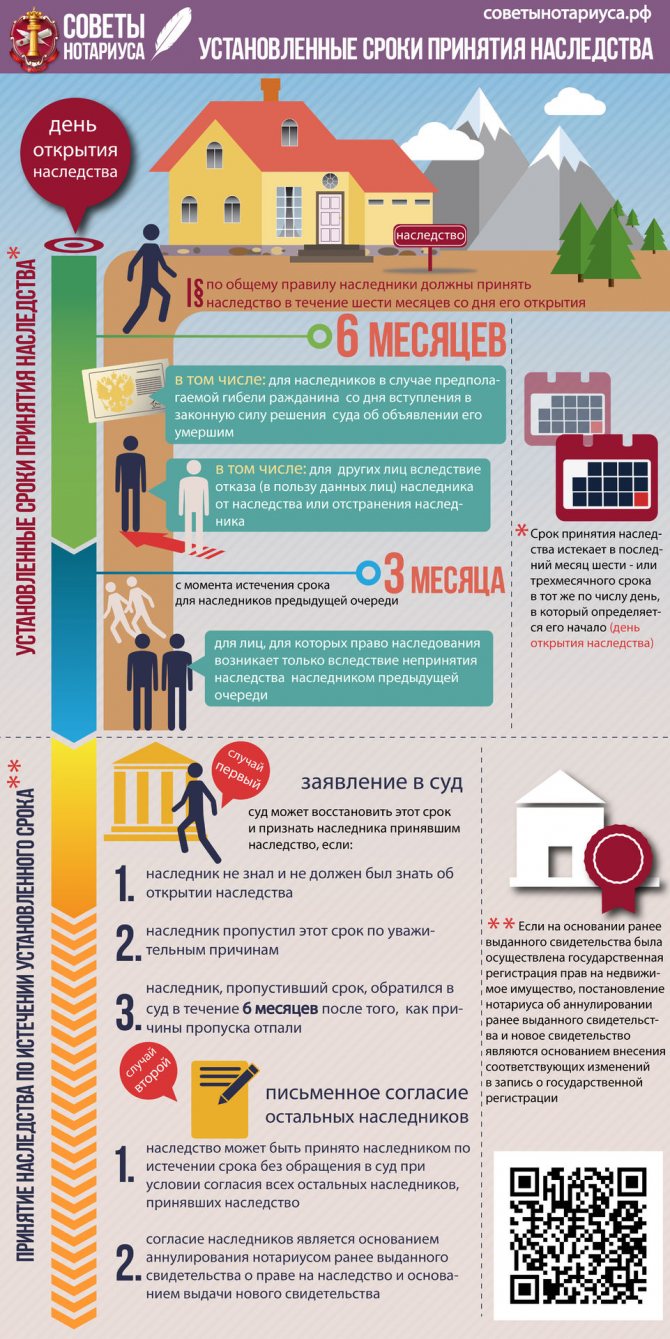
Established deadlines for accepting an inheritance
On a note! An application for inheritance should be submitted at the last place of residence of the deceased.
When notified of inheritance under a will, the recipient should go to a notary. No later than 15 days from the date of death, the notary is obliged to make an appointment with the heir, after visiting which he will learn about the terms of the will in the presence of two witnesses.
To enter into an inheritance, you will need to submit a letter (by putting your signature on it) to the notary who opened the case.
Attention! Registration of inherited property is a paid service. The cost starts at an average of 2,000 rubles.
Search by notary for heirs
A notary can inform about the right to property to people specified in the will or claiming property by law.
He retains the opportunity to publish a notice in the media to increase the chances that a legal heir will be found. This method is suitable in cases where the addresses of legal successors are unknown. But the notary is not obliged to check whether the testator has passed away. Law enforcement agencies and registry offices do not transmit data on the death of citizens to notary offices. He can only learn about this from applicants for the property.
Please note that notaries rarely search for potential heirs for free.
Searching for heirs via the Internet
Since 2021, heirs have been searched for on the official FNP portal. They publish information about deceased owners and open inheritance cases.
The online notary service simplifies the procedure for finding heirs. All inheritance processes opened by notaries throughout the country are uploaded here.

Go to the “Register of Inheritance Cases”
To find a case, you must provide information about the deceased testator:
- FULL NAME.;
- date of birth;
- date of death.

Enter the required data
Next, the system will open data about the notary with whom the case was opened.
Oddly enough, the search for potential heirs can also be carried out on social networks. This will help establish contact with the applicant for the property if the data from his page is known.
Search for heirs by heirs
Since 6 months are allotted for searching for heirs and registering rights to the property of the deceased, the applicants themselves are primarily interested in finding them.
The sooner the procedure is completed, the sooner he will become the owner of the property. Another reason for assistance in the search is punishment for withholding information about potential heirs. If the applicant did not inform the notary about the possible recipients of the property, then, according to Art. 1117 of the Civil Code, such a person may be recognized as unworthy, deprived of rights to the proper property.
Important! Regardless of how other heirs were found, to confirm their rights they must submit an application to the notary who opened the inheritance case.
Article 1117 of the Civil Code of the Russian Federation “Unworthy heirs”
Search for heirs by the buyer of real estate
The purchaser of an object must make sure in advance that the seller has obtained the rights to it legally.
In the case of inheritance, the risk lies in the possibility of the emergence of new heirs who have the right to sue even the sold property. Read also: Registration of a gift agreement in 2021
Since the basis for registration of property rights by the seller is the results of inheritance, you should review the inheritance file in advance.
All information about the property of the deceased is uploaded into a unified notary information system and stored in the electronic register of wills. In turn, online banking services allow you to view data on the accounts and deposits of the deceased.
Basic Rules
Let's start with the fact that the issues of searching for heirs change depending on whether the testator left a will or not. As is known in the Russian Federation, inheritance is possible in two ways: by law and by will. Each of us has the right to leave instructions in the event of our own death in relation to all property acquired during life, or in relation to only part of it. Each of us has the right, by will, to leave our property to any person we wish. It may even deprive those who have a right to claim it by law from inheritance. In this regard, there is complete freedom of will, limited only by the rules on compulsory share.

Article 1119. Freedom of will
Grounds and methods of inheritance
When was the will left
Any citizen has the right to leave such an order regarding his property in the event of death. If the rules of compulsory share are observed, the testator can, at his own discretion, bequeath property in favor of even an outside person, organization, or the entire state, while depriving of inheritance the one who could claim it by law.
Having a notarized order of the deceased regarding his property, the search for successors becomes a fairly simple task.
The notary has the specific names of those to whom a share in the inherited property is due and property rights are transferred. At the same time, information about the will itself, previously drawn up by a notary, has already been entered into the register of the Unified Information System of the Notary of the Russian Federation.
When there is no will (inheritance by law)
The rules established by law apply here. And they divide all beneficiaries, depending on the degree of relationship, into queues. The first includes close relatives of the deceased (parents, children, surviving spouses, grandchildren), the last includes distant and also disabled dependents who have the right to inheritance by virtue of the direct instructions of the law.
And the further you are in terms of degree of relationship, the less chance you have of hoping that the notary somehow knows not only about your place of residence, but also your existence in general.
It is inheritance by law that is associated with the emergence of a large number of issues related to the search for recipients of inherited property.

The inheritance procedure in this case is as follows:
- From the date of death of the testator, which will be considered for the inheritance and the date of opening, the notary opens an inheritance case.
- Applicants for a share in the estate of the deceased have six months to declare entry into the inheritance with a notary. And he, based on the rules of law (and if there is a testamentary disposition, according to his instructions), draws up the documents.
- If the period has expired and the heirs have not shown up, the property is declared escheated and will be transferred to the disposal of local authorities.
How to find an inheritance file by last name
Typically, a probate case is opened at the place of residence of the deceased person. In some cases, heirs contact the notary at the address where the object of inheritance or its most valuable part is located (Article 1115 of the Civil Code of the Russian Federation).
Here you can find out if there is a will. If there are several offices at the deceased person’s registered address, then the heir can visit each of them.
An alternative option is to search for an open inheritance case on the website of the Federal Notary Chamber. The service has been operating since 2021.
Anyone can find out where the inheritance case is opened. To do this, it is enough to know the data of the testator.
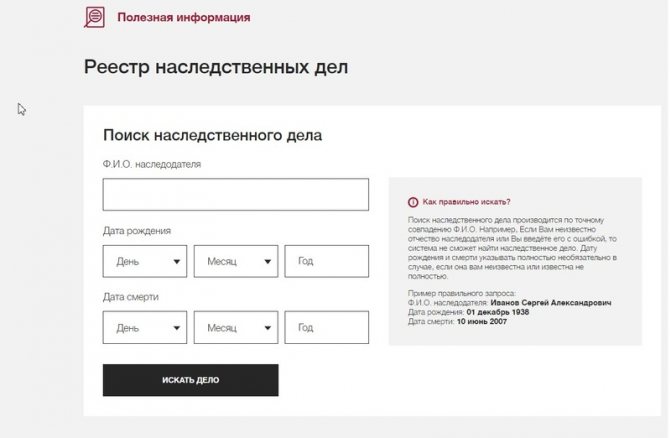
Additionally, you can enter information about the date of birth and death of the owner. However, the information is not mandatory. If you do not include dates, the service provides all testators with the specified data and the location of their inheritance affairs.
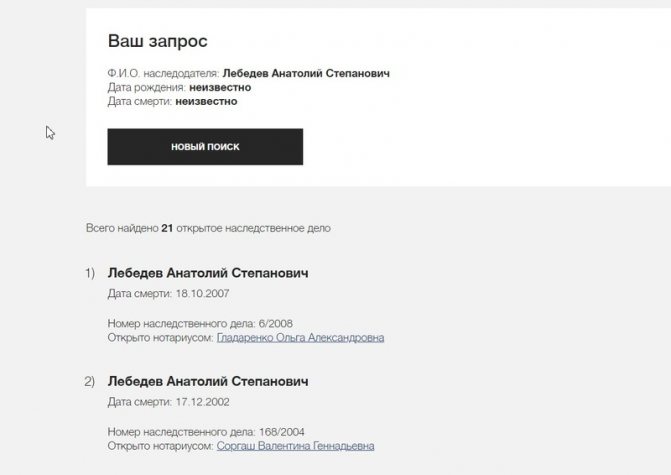
The Service contains general information only. Therefore, the heir will not be able to find out about the presence/absence of a will or the composition of the inheritance. This data can only be obtained directly from a notary.
Peculiarities of searching for heirs in the Russian Federation
In fact, everything is not so difficult. It is enough to turn to the archives, and most likely, the necessary documents will be found. Not many people know where to start searching and whether it is even possible to get hold of old documents somewhere.
Can help:
- Registry Office Archives
- House books
- Military archives (if the ancestors are military personnel)
- Party archives (today they can be useful and provide information about relatives)
- Archives of the Ministry of Internal Affairs (give information about passports)
- Personal files at enterprises or firms where a person worked
The notary is also interested in finding the necessary documents. In the absence of the necessary confirmation of relationship, the notary refuses to issue an inheritance. Naturally, a person will go to challenge this decision in court. And he has every chance of winning this trial. To avoid judicial red tape, it is much easier for a notary to advise the client where to go and help him find documents.
There are situations when it is not possible to find heirs. Then the property left by the person goes to the state. It's called escheat. The same becomes the property that the heirs abandoned or in a situation where they turned out to be unworthy of receiving an inheritance.
Citizens can be considered unworthy:
- Causing physical harm to the testator or his immediate relatives in order to obtain property
- Refused to care for the testator, despite a legally justified obligation to do so
- Those who are parents deprived of parental rights (if the testator is their child)
Mandatory heirs, regardless of the will, include disabled first-degree relatives, disabled children (natural or adopted), and minor children.

Particularly conscientious citizens who do not have close relatives can take care during their lifetime about who gets their property. To do this, you can contact distant relatives, find out their details and indicate them in the will. The compiled document greatly facilitates further work. If ties with your family are lost, you can turn to specialists for help, and they will help you find your relatives.
In a situation where relatives are not ready to accept the inheritance for one reason or another, they are required to confirm this in writing by formalizing a refusal to receive the property. If the testator is abroad and it is necessary to register the refusal in another country, there is no need to go there.
It is necessary to draw up a waiver application and have it certified at the nearest notary office.
Such a certified statement is sent by mail to the specialist conducting the case abroad. You can also act through a representative who, having secured a general power of attorney to conduct business and sign documents, can formalize all the necessary arrangements regarding the inheritance. This is a more complex and more expensive scheme, however, in some cases, such actions are justified.
Be that as it may, an experienced notary will always notify his ward of the need to draw up a will. Even if there are no relatives, the testator can draw up a document in favor of the state. This will also make the lawyer’s work easier in the future.
Which notary should handle inheritance business?

A candidate for receiving material benefits (or part thereof) has the right to resort to private services or specialists from the state notary chamber. Having chosen one of these options, the potential heir must submit a qualifying application. The opening of an inheritance case must be carried out at the place of permanent residence of the deceased.
If there are no difficulties in determining the place, any notary working in the chamber of a given district can deal with this matter. Compulsory membership of all notaries working privately in the district is considered a strict requirement.
In a situation where difficulties arise in identifying a notary, the following options are possible:
- In the notarial environment, the principle of distributing inheritance cases according to the first letter of the surname applies. Documents are submitted to the notary to whom certain names of deceased citizens are assigned.
There are also general professional requirements for notaries, including those dealing with inheritance matters. First of all, they are lawyers with high moral qualities. Their activities are regulated by legislative acts. For example, in Moscow there is a “Professional Code” approved by the members of the MGNP more than 15 years ago.






